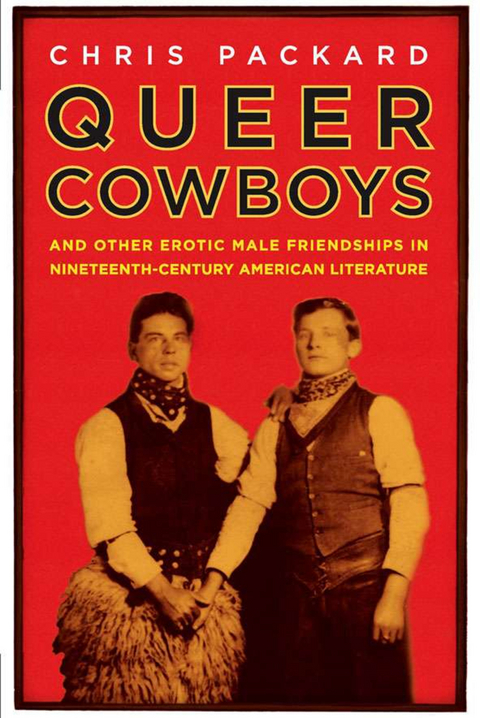
Queer Cowboys
And Other Erotic Male Friendships in Nineteenth-Century American Literature
Seiten
2005
Palgrave Macmillan (Verlag)
978-1-4039-7597-3 (ISBN)
Palgrave Macmillan (Verlag)
978-1-4039-7597-3 (ISBN)
An insight into to the male-only clubs of journalists, cowboys, miners, Indians and vaqueros who defined themselves by excluding women and the cloying ills of domesticity. He recovers a forgotten culture of exclusively masculine, sometimes erotic, and often intimate camaraderie in the cultural and artistic output of the 1800's Wild West.
Why do the earliest representations of cowboy-figures symbolizing the highest ideals of manhood in American culture exclude male-female desire while promoting homosocial and homoerotic bonds? Evidence from the best-known Western writers and artists of the post-Civil War period - Owen Wister, Mark Twain, Frederic Remington, George Catlin - as well as now-forgotten writers, illustrators, and photographers, suggest that in the period before the word 'homosexual' and its synonyms were invented, same-sex intimacy and erotic admiration were key aspects of a masculine code. These males-only clubs of journalists, cowboys, miners, Indian vaqueros defined themselves by excluding femininity and the cloying ills of domesticity, while embracing what Roosevelt called 'strenuous living' with other bachelors in the relative 'purity' of wilderness conditions. Queer Cowboys recovers this forgotten culture of exclusively masculine, sometimes erotic, and often intimate camaraderie in fiction, photographs, illustrations, song lyrics, historical ephemera, and theatrical performances.
Why do the earliest representations of cowboy-figures symbolizing the highest ideals of manhood in American culture exclude male-female desire while promoting homosocial and homoerotic bonds? Evidence from the best-known Western writers and artists of the post-Civil War period - Owen Wister, Mark Twain, Frederic Remington, George Catlin - as well as now-forgotten writers, illustrators, and photographers, suggest that in the period before the word 'homosexual' and its synonyms were invented, same-sex intimacy and erotic admiration were key aspects of a masculine code. These males-only clubs of journalists, cowboys, miners, Indian vaqueros defined themselves by excluding femininity and the cloying ills of domesticity, while embracing what Roosevelt called 'strenuous living' with other bachelors in the relative 'purity' of wilderness conditions. Queer Cowboys recovers this forgotten culture of exclusively masculine, sometimes erotic, and often intimate camaraderie in fiction, photographs, illustrations, song lyrics, historical ephemera, and theatrical performances.
CHRIS PACKARD teaches Literature and Writing at New York University and New School University, USA.
Introduction Decoding the Encrypted Erotics of Nineteenth-Century Westerns Intersections of Race and Homosexuality in the Wilderness Scandal in the Boom Towns: Print Cultures and Sexual Prohibitions Cowboy Poses: The Queer Eye in Early Photographs Singing From the Saddle: The 'Wild' West Goes Vaudeville Conclusion
| Zusatzinfo | IX, 144 p. |
|---|---|
| Verlagsort | Gordonsville |
| Sprache | englisch |
| Maße | 140 x 216 mm |
| Themenwelt | Kunst / Musik / Theater ► Film / TV |
| Geisteswissenschaften ► Geschichte ► Allgemeines / Lexika | |
| Geschichte ► Teilgebiete der Geschichte ► Kulturgeschichte | |
| Naturwissenschaften | |
| Sozialwissenschaften ► Kommunikation / Medien ► Medienwissenschaft | |
| Sozialwissenschaften ► Soziologie ► Allgemeines / Lexika | |
| Sozialwissenschaften ► Soziologie ► Gender Studies | |
| ISBN-10 | 1-4039-7597-3 / 1403975973 |
| ISBN-13 | 978-1-4039-7597-3 / 9781403975973 |
| Zustand | Neuware |
| Haben Sie eine Frage zum Produkt? |
Mehr entdecken
aus dem Bereich
aus dem Bereich
der stille Abschied vom bäuerlichen Leben in Deutschland
Buch | Hardcover (2023)
C.H.Beck (Verlag)
23,00 €
vom Mittelalter bis zur Gegenwart
Buch | Softcover (2024)
C.H.Beck (Verlag)
12,00 €


